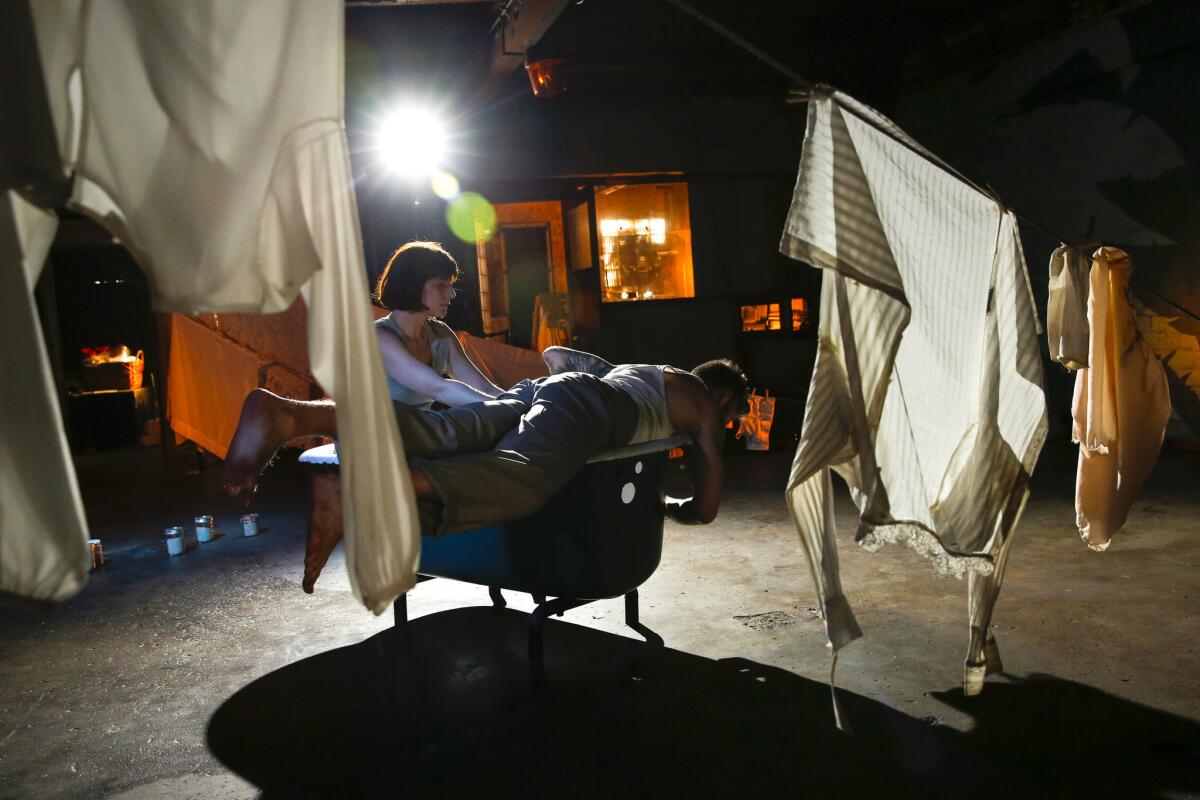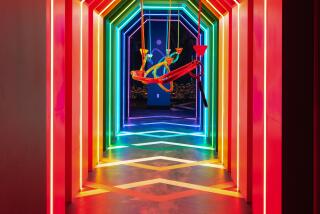Immersive theater appeals to audiences wanting to take part in art

The warehouse is cold and dark. A claw-foot bathtub sits in the middle of the room, which is bisected by lines of hanging laundry. Against one wall, a large wooden bar; against another, a shabby kitchen and bedroom. An office cluttered with clocks and a caged industrial workspace complete the meticulous set.
Suddenly a large gate door creaks open, and a figure clad in a thick leather apron and a welder’s mask strides in.
“Are you afraid of anything at all? Afraid of your heartbeat? Or the eyes of strangers! Afraid of breathing? Afraid of not breathing?” the figure asks while another similarly dressed performer bangs rhythmically on the industrial cage. “Do you wish things could be straight and simple again, as they were in your childhood?”
Over the course of 90 minutes, a standing audience of 30 watches an immersive theater performance unfold inside the 3,000-square-foot Los Angeles Arts District warehouse. “The Day Shall Declare It,” produced by the L.A.-based experimental theater company Wilderness and the arts support network Los Angeles Performance Practice, staged its U.S. premiere last weekend after a critically acclaimed run in London last year.
Immersive theater takes place without a stage of any kind, in deserted industrial spaces, nightclubs, hospitals, hotels and more. It invites audience members to explore the action at their own pace by following performers around. Guests can roam the site at will, experiencing it as an interactive art installation.
The idea has been gaining currency. It’s particularly popular in London, largely thanks to an immersive theater company called Punchdrunk that in 2007 staged the hit “The Masque of Red Death.” In 2011, Punchdrunk came to New York City and performed a sold-out show called “Sleep No More.”
Olya Petrakova and Bryan Brown of Schkapf theater and Noah Nelson of the No Proscenium theater newsletter presented the first immersive theater conference in Los Angeles in September. About 30 members of traditional and experimental theater companies around the city attended.
“The Day Shall Declare It” cobbles together Tennessee Williams’ one-act plays from the book “American Blues” with text from Studs Terkel’s 1974 book, “Working.” The show examines the nature of work and the effect that work has on the lives of those who do it.
The impersonal nature of the digital era makes immersive theater particularly relevant for audiences, says Wilderness Artistic Director Annie Saunders, who stars in the show and co-directed it with Sophie Bortolussi.
Finding yourself in the thick of the action, rather than a passive observer in the dark, helps people to feel alive, she says, as if they’ve truly experienced something.
“Immersive theater is important right now because it brings people back to the texture of life,” Bortolussi adds. “This is a very intimate experience, and people have very different ways of reacting to it. In our day and age, it can be very uncomfortable to receive true intimacy.”
Sound designer John Zalewski is responsible for heightening this intimacy through the soundtrack, which is emitted through speakers hidden around the space. The effect is dizzying as it comes at you from all sides in a rush.
“This is theater’s reaction to the screen and to the proscenium as a type of screen,” Zalewski says. “People want to go deeper into these spaces; they want to become their own cameras and their own storytellers.”
This might sound like a millennial sentiment, but all the cast members in the show are in their 30s. Likewise, they say the opening weekend crowd was quite mixed.
A week before the show was set to debut, the mood in the room before rehearsal was nervous excitement. The X-factor each night is how a particular audience will react to the activity around it. There is no way to tell where audience members will stand or what the effect of the action will be on them.
“You have to know the material so well that you have two brains,” says performer Chris Polick, who is British and bears an uncanny resemblance to Jude Law. “There’s the acting brain, and then there’s the health-and-safety brain, which is working out how this can be done safely and correctly and how to respond to what’s happening in the room with these people.”
Audiences are usually well behaved, although occasionally, Polick says, you get the “overly engaged” person who wants to run all over the room.
Considering the elaborate nature of the set, that’s an easy impulse to have. The design of the space conjures a working-class, at times impoverished milieu straight out of the 1930s, with lots of attention to detail. Stacks of dishes, lace doilies, old lighting fixtures and wooden crates are everywhere.
“I wanted to do something that had a contemporary experimental form with a movement vocabulary, but using text from the last time there was a great economic upheaval in America,” Saunders says. “So I was looking at this whole canon of labor plays from the Great Depression.”
The plays of Williams won out thanks to their rich sense of humanity. Plus, Saunders says, Williams was constantly experimenting with his work and was a big advocate of increasing theater’s flexibility, of bending and expanding the genre.
The show has about five sections and covers a warehouse that was built in 1925 and had been an engine shop. Saunders secured it for the show with help from the office of City Council member Jose Huizar.
Although the stories are not told in a traditional manner, a narrative of sorts emerges throughout, and people will recognize themes and motifs, including “men drinking, oblivion, escape and the onslaught of time,” says Saunders, who was attracted to these ideas thanks to her own conflicted relationship with work and the trappings that often come with it.
“There is this split between what I want to do with my life and how I use work to actualize myself,” she says, “and the feeling many people share of the tedium of needing to work for a living.”
Fortunately for her, she says, “The Day Shall Declare It” isn’t work. It’s a shared artistic expression.
Twitter: @jessicagelt
------------------------------
‘The Day Shall Declare It’
Where: Imperial Arts Studios, 2051 E. 7th St., Los Angeles
When: 8:30 p.m. Wednesdays, Thursdays and Fridays and 7 p.m. Saturdays and Sundays, through March 22
Tickets: $25
Info: https://www.thisisthewilderness.com
More to Read
The biggest entertainment stories
Get our big stories about Hollywood, film, television, music, arts, culture and more right in your inbox as soon as they publish.
You may occasionally receive promotional content from the Los Angeles Times.











